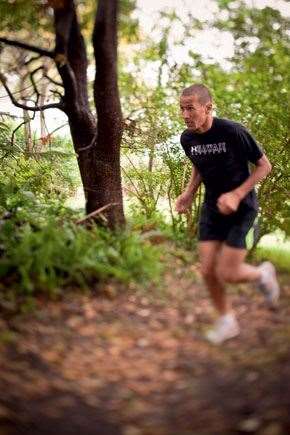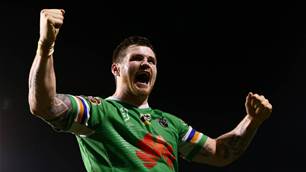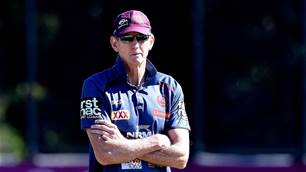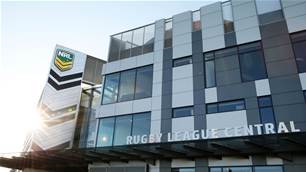Convention regularly gets thrown out the window in Camp Macca strategic meetings; he does what works,
 Chris McCormack Triathlon Run
Chris McCormack Triathlon RunImages: Shelby Hayden Craig
COMEBACK TRAIL
“When I was young I used to do this Olympic stuff. Prior to the Sydney Olympics I was world No.1, and the federation [Triathlon Australia] plotted to leave me off the team because they saw me as too inexperienced. Even though I was a world champion, earned Australia its third triathlon spot at the Games, they said, ‘You’re not going.’ At that point in my life I turned my back and said, ‘You know what? I’m moving to America; I’m becoming pro.’ Not that you weren’t pro under federation laws, but you were very much dictated to by the national federation, as are all triathletes who want to race at the Olympics. The federation says you have to
meet the criteria, so they set races and you’re very limited in your sponsorship portfolio. I thought, ‘Up yours, I’m outta here.’
“Missing the Olympics in Sydney was the best thing that happened to me in my career. I was angry, peeved off and I went on and did amazing things. And then the federation called me back for Athens because I was by far the best Australian in the world. They said, ‘Will you trial for Athens?’ I asked, ‘Will you put me in the team?’ They said, ‘No. You’re going to have to qualify.’ So I said, ‘I’m out.’ And never spoke to the federation again. It wasn’t bitterness anymore, I just didn’t need them. I was doing Ironman racing, I was doing my own thing.
“Then after winning the Ironman World Championship last year in Kona, again ‒ I’m 38, which in endurance sports terms is at the older, twilight end ‒ I came home and sort of made peace with the federation and this opportunity presented itself about coming around for London. “They asked, ‘Would you be interested in trialling for London?’ I said, ‘Mate, it’s been ten years since I ... I’m a completely different beast now. I’m slow. These kids are 21, they’re fast.’ They said, ‘There’s an opportunity to go if you want to go.’ I spoke to my wife and thought, ‘You know what? I’ve got nothing to lose. I’m in a different phase. My sponsors are supportive of me, I have more freedom with the federation, I stand on par with them to some degree. I don’t need their money, I don’t need their tracksuits, etc.’
“So we looked at it and they showed me the criteria set out in stone in the sense that they’re looking at the three best Australians in their eyes going and the ‘best’ Australians will be the people who perform the best at three events. I thought, ‘You know what? Nothing to lose and everything to gain. I’m going to have a crack at it.’ “There are no guarantees, though. I’m under no illusions that it’s going to be a walk into the Australian Olympic team. If I make it I’ll be the oldest-ever endurance athlete to compete at an Olympic Games.”
WATER WORLD
“Swimming is where I have to do a lot of catch-up work, coming from Ironman, where the swim is such a small portion of a course; less than an hour of an eight-hour race. The ratio is relatively the same now in Olympic-distance racing, but the intensity and pace of the Olympic-standard swimmers is amazing. The swim leg is so imperative. If you lose 25 seconds, groups can work together to pull away. I’ll be touching around 45-50km a week, just to get my swimming up to where these guys are. To put it in perspective, the competitors leading these triathlon swims would be swimming in the 1500m final at the Australian championships.
“I swim every day. My longest swim will be eight kilometres, my shortest would be six. I swim with a great squad at the Caringbah Leisure Centre. I put myself in the hands of Roz Moller, the coach there. She knows my objective; we’ve sat down and worked out where I need to be. She’s a swimming coach in the sense that she coaches swimmers. I need to learn to dive, because triathlons are dive-starts off a pontoon. It’s natural to lose your speed as you age. Mine will be a lot of speed-intensive work, just to get that turnover back on again and get this body able to produce lactate, which has been very, very painful.”
BIKE BANDIT
“The regular ITU guys’ run is superior, their swim is superior, but my strength against them is that I have a lot more bike power.“For the Olympic-distance stuff, I won’t have to do the volumes of training I was doing for Ironman preparation, where I’d ride about 1000km a week. Of that, 90 per cent was done at a relatively steady effort and pace. Now, I’ll only be doing about 400 kilometres a week; less than half. But 90 per cent of that is going to be at a high intensity; relatively fast, attention to the detail. I’m no longer a diesel engine, it’s time to be a high-performance engine, if you like. It will lean me up a lot more and get my muscle patterns firing a lot quicker, which is one of the things you lose when you age.
“My longest bike session will be five hours, my shortest will be an hour. It differs every single day. As I’ve gotten older my training patterns have definitely evolved; I’m no longer locked into anything. You have to be a little bit more adaptive when you’re in your mid-30s. I was with Lance Armstrong in Austin, Texas this year and we were talking about how we’ve been successful in our mid-30s and agreed it was definitely down to this flexibility in our programs. “Youth allows you to make mistakes. As you get older you don’t have that luxury. Instead of a seven-day training cycle, I’ll have a ten-day training cycle. I seem to be very attentive to recovery and attentive to the little things I was a bit lax with in my early 20s.”
Related Articles

Chuffin' hell, here come more Poms!

Souths in shock Bennett swoop













